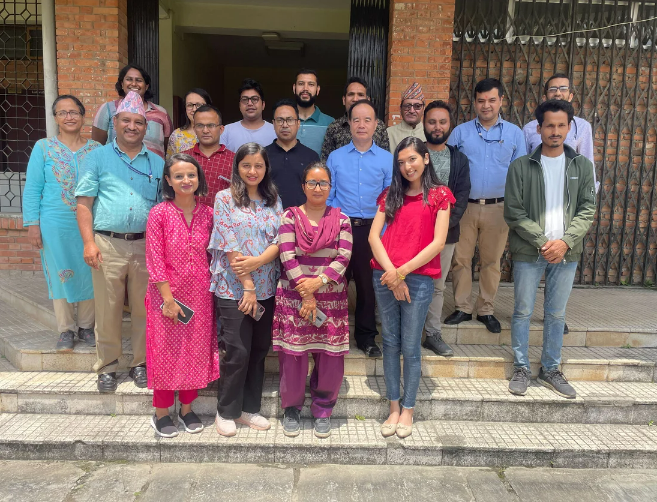SaniPath International Updates!
Dear Colleagues,
As we reach the midpoint of 2023, the SaniPath International team is excited to share our latest updates with you. Our dedicated efforts have resulted in the acquisition of several new contracts for SaniPath International, and we are excited to be able to continue our commitment to evidence-based data collection and its crucial role in shaping public health decision-making through these projects.
Strengthening Wastewater-Based Epidemiology in Kathmandu
We held a successful training in Wastewater Based Epidemiology (WBE) conducted in Kathmandu. This initiative, funded by the Asian Development Bank, aims to support the Nepali Government in building its capacities for WBE and implementing a wastewater surveillance strategy in Kathmandu.
The training brought together participants from key organizations including the Kathmandu Valley Water Supply Management Board, Project Implementation Directorate (PID), Department of Health Services-Epidemiology and Disease Control Division (DoHS-EDCD), Kathmandu Upatyaka Khanepani Limited, and the Central Department of Microbiology, Tribhuvan University.
The goal of this project is to enhance the Nepali Government's capacity in utilizing wastewater-based epidemiology as a valuable tool for public health surveillance. By monitoring wastewater for the presence of pathogens and genetic material, such as SARS-CoV-2, we can gain valuable insights into community-level health and the effectiveness of public health interventions.
For more information on this work or our work related to environmental surveillance of pathogens, please email suraja@sanipth.org.
Habib Yakubu's Presentation at Global Summit on WASH in Healthcare Facilities in Amman Jordon
Habib Yakubu, Senior Researcher from Emory University, was invited as a panelist at the Global Summit on WASH and Waste in Health Care Facilities in Amman, Jordan on June 15th 2023. The summit, organized by WHO and UNICEF, brought together experts to discuss critical issues in healthcare facility sanitation. Habib shared the stage with professionals from WaterAid, US CDC, Malteser International, and World Vision.
In his presentation, Habib highlighted the low hand hygiene compliance among healthcare workers in low and middle-income settings and emphasized the importance of mhealth interventions and environmental cues in improving adherence to treatment guidelines. In his capacity at Emory University, Habib Yakubu and colleagues conducted a study in the Greater Kampala Metropolitan Area, using a cluster randomized trial and the Behavior Centered Design model. The results showed significant improvements in hand hygiene practices after implementing interventions. Habib also addressed the critical research gap in environmental cleaning in healthcare facilities, raising questions about standards, system strengthening, and behavior change techniques.
Please reach out to Habib Yakubu at habib@sanipath.org for more information on the presentation and discussion.
Using the SaniPath Tool for Cholera Outbreaks
Amidst the ongoing cholera outbreak throughout Africa, it’s important to identify how individuals are getting exposed to this bacteria, to develop effective interventions. The SaniPath Exposure Assessment Tool has been used to identify pathways and transmission routes of V. cholerae and can be a complementary approach to environmental surveillance of cholera.
In Lusaka, Zambia, E. coli exposure results from a SaniPath deployment aligned with suspicions that shallow wells were a source of exposure to fecal contamination to local populations that eventually led to closing shallow wells and providing additional water sources to mitigate exposure to cholera during an outbreak. In Kenya we have demonstrated the Tool’s efficacy in measuring both E. coli and V. cholerae and results about exposure to cholera are being used to inform vaccination campaigns. By facilitating an understanding of the factors contributing to the transmission of this waterborne disease, the Tool can play a crucial role in addressing the outbreak and preventing further spread.
We welcome collaborations with organizations and individuals working on cholera prevention and public health. If you have any questions or would like to explore potential collaborations, please email sarah@sanipath.org.
Other SaniPath Related News!
Check out this SanPath featured in this recently released article: Exploring the usage and impact of urban sanitation tools targeting low- and middle-income countries.
Save the Date! FSMA Spotlights: August 3, 2023. Link here
Stay tuned for more updates as we embark on new projects, leverage our expertise, and collaborate with like-minded organizations to create lasting impact. Our dedication to evidence-based research, cutting-edge tools, and collaborative partnerships will continue to drive our progress.
Sincerely,
The SaniPath Team


